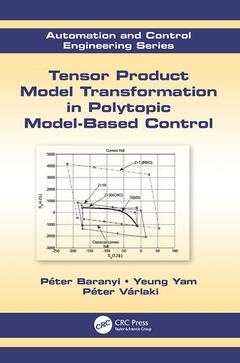Tensor Product Model Transformation in Polytopic Model-Based Control Automation and Control Engineering Series
Auteurs : Baranyi Péter, Yam Yeung, Várlaki Péter

Tensor Product Model Transformation in Polytopic Model-Based Control offers a new perspective of control system design. Instead of relying solely on the formulation of more effective LMIs, which is the widely adopted approach in existing LMI-related studies, this cutting-edge book calls for a systematic modification and reshaping of the polytopic convex hull to achieve enhanced performance. Varying the convexity of the resulting TP canonical form is a key new feature of the approach. The book concentrates on reducing analytical derivations in the design process, echoing the recent paradigm shift on the acceptance of numerical solution as a valid form of output to control system problems. The salient features of the book include:
- Presents a new HOSVD-based canonical representation for (qLPV) models that enables trade-offs between approximation accuracy and computation complexity
- Supports a conceptually new control design methodology by proposing TP model transformation that offers a straightforward way of manipulating different types of convexity to appear in polytopic representation
- Introduces a numerical transformation that has the advantage of readily accommodating models described by non-conventional modeling and identification approaches, such as neural networks and fuzzy rules
- Presents a number of practical examples to demonstrate the application of the approach to generate control system design for complex (qLPV) systems and multiple control objectives.
The authors? approach is based on an extended version of singular value decomposition applicable to hyperdimensional tensors. Under the approach, trade-offs between approximation accuracy and computation complexity can be performed through the singular values to be retained in the process. The use of LMIs enables the incorporation of multiple performance objectives into the control design problem and assurance of a solution via convex optimization if feasible. Tensor Product Model Transformation in Polytopic Model-Based Control includes examples and incorporates MATLAB® Toolbox TPtool. It provides a reference guide for graduate students, researchers, engineers, and practitioners who are dealing with nonlinear systems control applications.
Introduction. I Tensor Product (TP) Model Formulation. TP Model. TP Model Transformation. TP Canonical Model Form. Approximation and Complexity Trade-off. TP Model Convexity Incorporation. Introduction of the TPtool Toolbox. Centralized Model Form. Computational Relaxed TP Model Transformation. II TP Model-based Control System Design. Overview of TP Model-based Design Strategy. LMI Theorems under PDC Framework. Convex Hull Manipulation. III Control Design Examples. Control Design with TPtool Toolbox. 2-D Prototypical Aeroelastic Wing Section with Structural Nonlinearity. 3-D Prototypical Aeroelastic Wing Section with Structural Nonlinearity. 3-DoF Helicopter with Four Propellers. Heavy Vehicle Rollover Prevention Problem.
Peter Beranyi, Ph.D, D. Sc, is head of the Computer and Automation Research Institute of the Hungarian Academy of Sciences and a professor at the Budapest University of Technology and Economics. He received his D.Sc in Informatics, his Ph.D. in Electrical Engineering, his M.Sc. in Education of Engineering Science, and his M.Sc. in Electrical Engineering at Budapest University of Technology and Economics. His research interest is on LPV- and LMI-based control design, modeling based on TP functions, fuzzy modeling, fuzzy rule interpolation, and calculation complexity reduction of various model types. He has written 48 journal papers for 262 publications.
Yeung Yam, is a professor in the Department of Mechanical and Automation Engineering at the Chinese University of Hong Kong. He obtained his B.Sc. from the Chinese University of Hong Kong, his M.Sc. from the University of Akron, Ohio, USA and his M.Sc., D.Sc. from the Massachusetts Institute of Technology, Cambridge, Massachusetts, USA. He has published over 100 technical papers in various areas of research, including human skill acquisition and analysis, dynamics modeling, control, system identification, fuzzy approximation, and intelligent and autonomous systems.
Peter Valarki, is a professor at the Budapest University of Technology and Economics. He graduated in mechanical engineering in 1971 at the Faculty of Transportation Engineering at the Technical University of Budapest, now the Budapest University of Technology and Economics. He also earned his Ph.D., his C.Sc. and his D.Sc. He is a founding member of the Hungarian Academy of Engineering and the main topics of his research field are the stochastic control theory, statistical system identification, and computational intelligency. He is the co-author of 10 books and more than 250 other scientific and technical publications.
Date de parution : 04-2017
15.6x23.4 cm
Disponible chez l'éditeur (délai d'approvisionnement : 14 jours).
Prix indicatif 71,13 €
Ajouter au panierDate de parution : 08-2013
Ouvrage de 250 p.
15.6x23.4 cm
Disponible chez l'éditeur (délai d'approvisionnement : 15 jours).
Prix indicatif 184,47 €
Ajouter au panierThème de Tensor Product Model Transformation in Polytopic... :
Mots-clés :
Tp Model; Higher Order Singular Value Decomposition of Tensors; LMI; Application to Parallel Double Inverted Pendulum; PDC; TP model transformation based design; Vertex Systems; Computational relaxed TP model transformation; Weighting Functions; TP model transformation; Tp; Tensor Product; Convex Hull; LTI; Nonzero Singular Values; LMI Design; LMI Optimization; Singular Values; Core Tensor; Polytopic Model; Asymptotic Stabilization; Interior Point Method; Observer Based Output Feedback Controller; HOSVD; LTI System; Observer Based Output Feedback; Control System Design; Tp Form; Desired Control Performance; System Matrix
